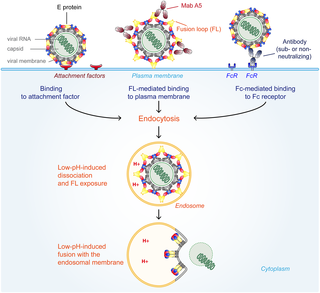PLoS Pathogens ( IF 6.7 ) Pub Date : 2017-09-15 , DOI: 10.1371/journal.ppat.1006643 Denise Haslwanter 1 , Dieter Blaas 2 , Franz X Heinz 1 , Karin Stiasny 1

|
Antibody-dependent enhancement of viral infection is a well-described phenomenon that is based on the cellular uptake of infectious virus-antibody complexes following their interaction with Fcγ receptors expressed on myeloid cells. Here we describe a novel mechanism of antibody-mediated enhancement of infection by a flavivirus (tick-borne encephalitis virus) in transformed and primary human cells, which is independent of the presence of Fcγ receptors. Using chemical cross-linking and immunoassays, we demonstrate that the monoclonal antibody (mab) A5, recognizing an epitope at the interface of the dimeric envelope protein E, causes dimer dissociation and leads to the exposure of the fusion loop (FL). Under normal conditions of infection, this process is triggered only after virus uptake by the acidic pH in endosomes, resulting in the initiation of membrane fusion through the interaction of the FL with the endosomal membrane. Analysis of virus binding and cellular infection, together with inhibition by the FL-specific mab 4G2, indicated that the FL, exposed after mab A5- induced dimer-dissociation, mediated attachment of the virus to the plasma membrane also at neutral pH, thereby increasing viral infectivity. Since antibody-induced enhancement of binding was not only observed with cells but also with liposomes, it is likely that increased infection was due to FL-lipid interactions and not to interactions with cellular plasma membrane proteins. The novel mechanism of antibody-induced infection enhancement adds a new facet to the complexity of antibody interactions with flaviviruses and may have implications for yet unresolved effects of polyclonal antibody responses on biological properties of these viruses.
中文翻译:

抗体介导增强黄病毒感染的新机制
病毒感染的抗体依赖性增强是一种充分描述的现象,它基于感染性病毒-抗体复合物与骨髓细胞上表达的 Fcγ 受体相互作用后的细胞摄取。在这里,我们描述了一种抗体介导的增强黄病毒(蜱传脑炎病毒)感染的新机制,该机制与 Fcγ 受体的存在无关。使用化学交联和免疫分析,我们证明单克隆抗体 (mab) A5,识别二聚体包膜蛋白 E 界面处的表位,导致二聚体解离并导致融合环 (FL) 的暴露。在正常感染条件下,该过程仅在病毒被内体中的酸性 pH 摄取后触发,导致通过 FL 与内体膜的相互作用启动膜融合。病毒结合和细胞感染的分析以及 FL 特异性单克隆抗体 4G2 的抑制表明,在单克隆抗体 A5 诱导的二聚体解离后暴露的 FL 介导了病毒在中性 pH 下也与质膜的附着,从而增加病毒传染性。由于抗体诱导的结合增强不仅在细胞中观察到,而且在脂质体中也观察到,增加的感染很可能是由于 FL-脂质相互作用而不是与细胞质膜蛋白的相互作用。



























 京公网安备 11010802027423号
京公网安备 11010802027423号